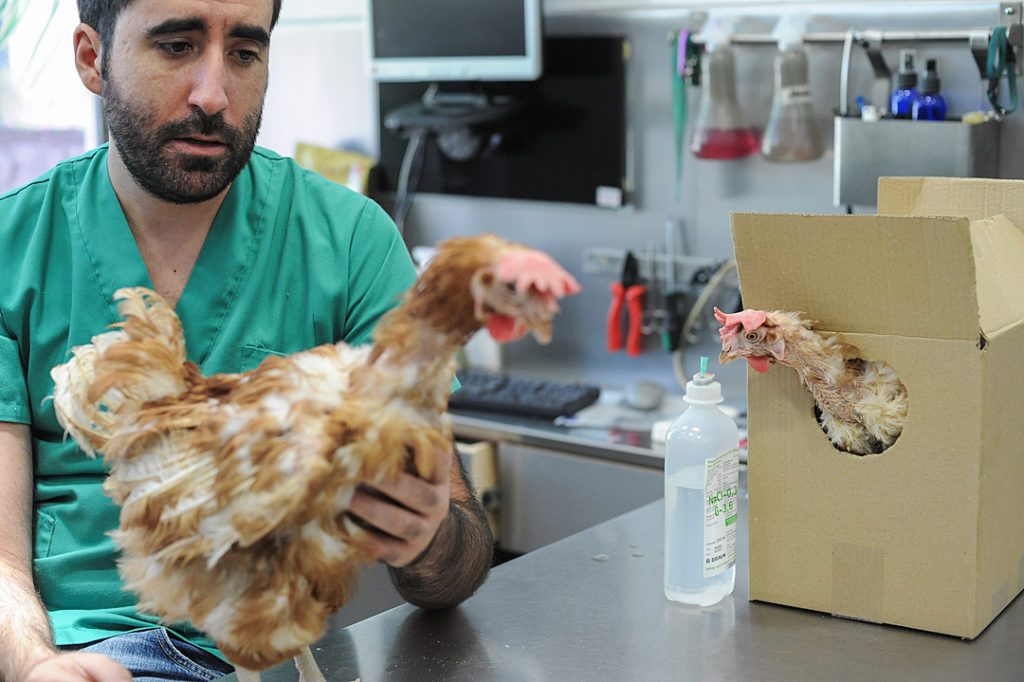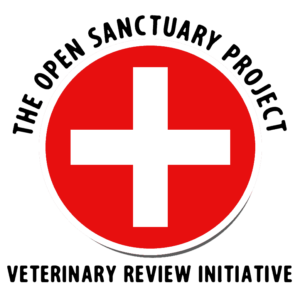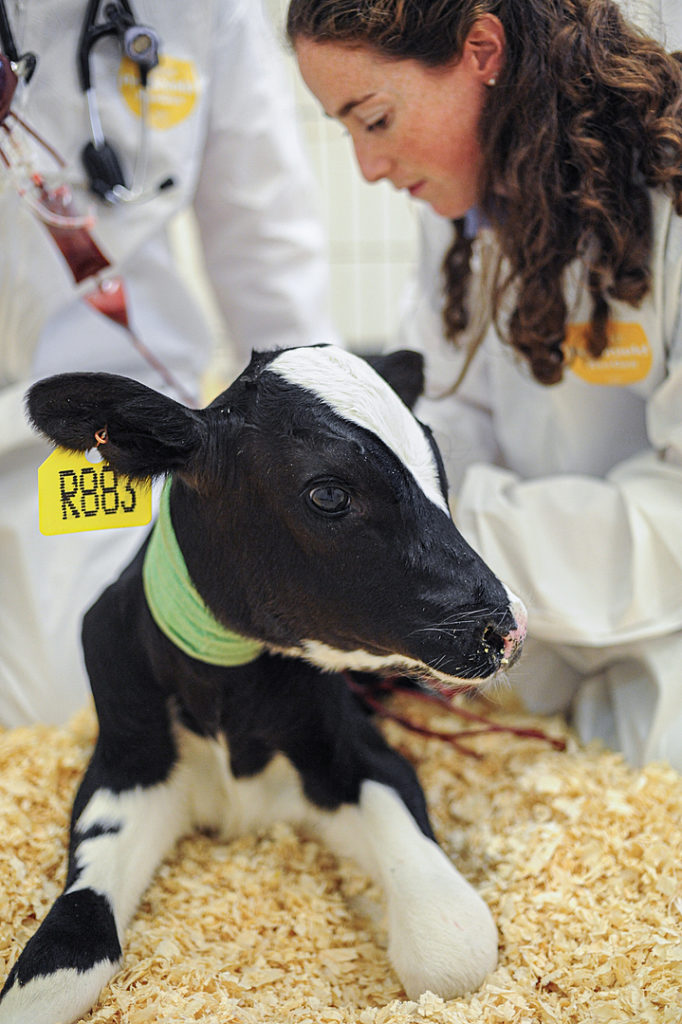
This resource was updated as part of the veterinary review process. It was originally published on February 7, 2022.

Veterinary Review Initiative
This resource has been reviewed for accuracy and clarity by a qualified Doctor of Veterinary Medicine as of February 2023.
Check out more information on our Veterinary Review Initiative here!
Appropriate veterinary care is a crucial aspect of animal care. Over time, a person working closely with a particular species will learn more about their care and may be better able to identify some specific health issues, but even the most experienced caregiverSomeone who provides daily care, specifically for animal residents at an animal sanctuary, shelter, or rescue. will still need to (and should!) rely on their veterinarian for a variety of things. If you care for multiple species, you may very well need multiple veterinarians. This is important to keep in mind particularly if you care for species with vastly different care needs. Consider the differences between pigs and tortoises, or turkeysUnless explicitly mentioned, we are referring to domesticated turkey breeds, not wild turkeys, who may have unique needs not covered by this resource. and betta fish, for example. It is always worth seeking veterinarians who are specialized in the care of the particular species you are caring for. While finding a veterinarian who has a recognized specialty can help, it’s also important to remember that some veterinarians have long years of experience or special interest in some species, and thus may be enthusiastic about working with them. To learn more about how to find a veterinarian for your residents, check out our resource here.
Be Aware Of The Law Around The Unauthorized Practice Of Veterinary Medicine!
It is important to realize that the practice of veterinary medicine is legally regulated and licensed on a state-by-state level within the United States. Veterinarians have extensive training and knowledge to practice animal medicine, and as experienced as an unlicensed caregiver may be, there is no substitute for veterinary advice when it comes to critical care decisions. In fact, most states have penalties for the unauthorized practice of veterinary medicine. It is important to be aware of the boundaries and limitations that unlicensed personnel must observe, as well as the penalties associated with violating such rules. When it comes to questions around what constitutes the practice of veterinary medicine at your sanctuary, we recommend you consult your state laws, your veterinarian, and legal counsel in your jurisdiction. As a general rule, making a diagnosis, prescribing medications (such as antibiotics or pain medications, for example), and performing surgery – by law – can ONLY be performed by a licensed veterinarian.
Veterinary Examinations
Performing regular health examinations yourself is an important part of caregiving, but these are not meant to replace veterinary examinations. And while you may primarily think of veterinary care as important when a resident is sick (and it is!), there are other types of visits your residents may benefit from. Your veterinarian can provide:

- Wellness Exams (routine exams to evaluate resident health) – There are many benefits that come from wellness exams. In addition to potentially catching signs of concern early, by assessing an individual routinely over the course of their life, your veterinarian will be able to gather information specific to them that may come in handy later on (for example, baseline blood work and vitals). Additionally, veterinarians can make recommendations on vaccines, fecal testing, and infectious disease testing to help maintain the health of your residents (discussed more below).
- Sick Patient Exams (to evaluate someone who is ill, injured, or showing signs of concern) – If one of your residents is not feeling well, is injured, or simply isn’t acting like themself, your veterinarian can conduct a thorough exam to determine the best course of action (which may require diagnostic testing, described below).
- Medical Progress Exams (to follow-up on medical conditions) – If one of your residents is recovering from a health issue or has a chronic issue you are managing, your veterinarian can assess their progress through follow-up exams. This follow-up allows them to evaluate how the individual is progressing and make changes to their treatment plan if needed.
Emergency Care

Unfortunately, not every situation can wait for an appointment to be scheduled or for your veterinarian’s office to open. This is why having emergency veterinary care lined up for your residents is imperative. While some veterinarians may be able to provide emergency care some or all of the time, not every veterinary practice has 24-hour services available. In order to ensure care is available to your residents 24/7, you may need to find a separate emergency clinic in your area. Do not wait until you have an emergency to figure out options in your area! Ask your veterinarian what happens if one of your residents requires care after hours or on a weekend or holiday. If they cannot provide care in these instances, ask if they have recommendations for after-hours care in the area.
Even during the hours when your veterinarian’s office is open, if someone needs immediate care, would they be able to see the individual immediately, or would you have to wait for an available appointment? If it is unlikely they’d be able to accommodate a visit without an appointment, ask for their recommendations regarding where to go.
A veterinarian should be able to provide supportive care to a resident who is in critical condition. This might include administration of fluids, intravenous medications, or oxygen therapy, among other things. If you have a good relationship with your veterinarian, they may also be able to talk you through how to provide immediate care to an individual either before bringing them to the veterinarian’s office or while waiting for the vet to arrive at your sanctuary.
Diagnostic Testing And Interpretation
Your veterinarian can help determine when diagnostic testing such as blood work or bacterial cultures are warranted and can interpret the results. While it can be tempting to try to interpret blood work yourself by comparing the results to normal reference ranges, interpreting blood work is more nuanced than just seeing which levels are out of the normal range – it also involves understanding what causes the various levels to be out of range, the relationship between different analytes, as well as how to interpret the results in conjunction with the individual’s clinical signs and any external factors that can impact results, such as stress from handling or how long the blood sample was sitting before being tested. You should always ask your veterinarian to explain in detail any abnormalities they report and ask to receive a copy of all diagnostic reports.
Your veterinarian can also help determine when advanced diagnostics, such as radiographs, ultrasound, or a CT scan are warranted. In cases where they cannot perform the procedure themselves, they can refer you to a specialist.
Surgery Or Other Medical Interventions
Should one of your residents need surgery or other advanced medical interventions, your veterinarian can perform these or refer you to someone else who can. This may include more routine procedures, such as neutering mammalian residents, or performing surgery in response to a health issue.

Unfortunately, when it comes to farmed animalsA species or specific breed of animal that is raised by humans for the use of their bodies or what comes from their bodies., there is quite a bit of information out there about do-it-yourself surgeries (for example instructions for performing bumblefoot surgery at home). This do-it-yourself mentality reflects the way most people view these species and not the actual needs of the species. All surgical procedures should be performed by a licensed and experienced veterinarian using appropriate anesthetics and analgesics.
Treatment Plans
It’s important to have a veterinarian involved in the creation of treatment plans for individuals who require medical intervention. Veterinarians comprehensively look at many factors (environment, age, breed, species, physical exam, diet, diagnostic tests, etc.) to make recommendations and treatment plans. This may include pain management or antibiotic treatment. Improper use of antibiotics contributes to the growing issue of antibiotic resistance, so be sure to work with your veterinarian to determine when and how antibiotics should be used and to have cultures done whenever possible. In addition to needing a veterinarian to prescribe medications, they can create treatment plans tailored to the individual’s specific needs. While some medications may be appropriate, generally, to treat a particular condition in a certain species, that does not mean the treatment is appropriate in every instance. When determining the most appropriate treatment for an individual in your care, your veterinarian can take the individual’s overall health into consideration, as well as any other medications or supplements they are currently taking.
If you have a good relationship with your veterinarian and they feel it is appropriate, your veterinarian may feel comfortable teaching you how to perform more specialized or advanced treatments if one of your residents requires it. This might include how to administer injectable medications or fluids, or how to continue managing an open wound after veterinary assessment.

Maintaining A Good Relationship With Your Veterinarian
There may be times when you and your veterinarian do not agree, but it is in your residents’ best interest for you to maintain a good relationship with your veterinarian. If you feel your veterinarian is not meet your needs or the needs of your residents, you should look for another veterinarian who can provide your residents with the care they need. For more information about maintaining a good relationship with your veterinarian, check out our resource on the subject here.
End-Of-Life Care
Because sanctuaries provide lifelong care to their residents, it’s important to have a relationship with a veterinarian who can provide compassionate end-of-life care if necessary. This includes palliative care and euthanasia. Unfortunately, as many of the species cared for at farmed animal sanctuariesAnimal sanctuaries that primarily care for rescued animals that were farmed by humans. are killed before reaching old age, some veterinarians may not have experience providing elder care or palliative care and may not have experience performing euthanasiaThe act of ending someone’s life to spare them from suffering or a significantly reduced quality of life that cannot be managed. in a way that is appropriate for sanctuary residents.
Though it can be painful to think about the possibility of one of your residents being euthanized, it’s important to have a discussion with your veterinarian (or prospective veterinarians) before you are in a situation where euthanasia is needed. There are multiple forms of euthanasia that are considered humane by the American Veterinary Medical Association (AVMA) that are not gentle or non-physical and that are in conflict with what a sanctuary would expect for their residents. Be sure to have a discussion about your euthanasia policies, and ask them upfront about whether they’d be comfortable and qualified to euthanize residents using gentle, non-physical methods that would also be commonly used for a companion cat or dog.
Post-Mortem Examinations
Your veterinarian can perform or facilitate a post-mortem examinationThe examination of an individual’s body after death to learn more about what led to their death, what was contributing to their clinical signs, the extent of disease, etc. to help determine a resident’s cause of death. While it can be difficult to think of our loved ones’ bodies being examined in this way, it can be a very useful tool that can not only protect other residents if you are dealing with a potentially contagious disease, but can also help both you and your veterinarian better understand, and therefore better respond to, similar health issues in the future. It can be frustrating if a post-mortem report doesn’t give you a specific cause of death (which, unfortunately, happens depending on the disease process and cause of death), but try to remember that simply being able to rule out other diseases as a result of the post-mortem examination can be very helpful in knowing what precautions, if any, you need to take with the rest of your residents. You can read more about the potential benefits of post-mortem examinations here.
Healthcare Protocols
In addition to treating the individuals in your care, your veterinarian can play an important role in establishing healthcare protocols for your sanctuary. By working with an experienced veterinarian who is familiar with your region and the specifics of your sanctuary and resident population, you can create healthcare protocols that are tailored to your specific needs. This may include:

- Incoming testing protocols – While fecal testing is a typical part of incoming procedures for new residents, there may be other incoming testing you should consider implementing. Your veterinarian can talk you through the various testing options available based on the species you care for and also the issues that are prevalent in your region. They can also explain what a positive result would mean for your sanctuary.
- Parasite screening/deworming – Your veterinarian can make recommendations about routine parasite screening, fecal testing, and dewormingThe act of medicating an animal to reduce or eliminate internal parasites, either prophylactically or in response to illness. protocols based on the parasite issues at your sanctuary or in your region. If there are signs of anthelmintic-resistance (resistance to deworming medications), they can make recommendations regarding how to revise your protocols so as to prevent/reduce resident exposure to parasites and avoid overusing anthelmintics.
- Vaccine protocols – Your veterinarian can make recommendations about what, if any, vaccinations your residents should receive, as well as how often. Some vaccines must be administered by a veterinarian, in which case, they can also administer these and provide the necessary paperwork for your records.
- Preventative care – Your veterinarian can recommend, and if necessary provide, preventative care to help protect your residents from certain health conditions. This may include diet, supplements, dental care, hormonal implants, or general care practices, depending on the species you care for.
- BiosecurityMerck Veterinary Manual defines biosecurity as ”the implementation of measures that reduce the risk of the introduction and spread of disease agents [pathogens].” measures – Your veterinarian can play an integral role in the development of a biosecurity plan for your sanctuary. Their knowledge and experience makes them well suited to assess your sanctuary’s risk of infectious disease introduction and spread, and based on their risk assessment, they can help identify appropriate biosecurity measures to mitigate these risks.
- Infectious disease outbreak response plan – Your veterinarian can play an important role in ensuring your sanctuary is prepared in the event of an infectious disease outbreak in your region, helping to create a response plan to ensure your residents are properly protected (if you care for birds, check out our resource about avian influenza for information on how to protect your residents from this disease should it be detected in your area). In the event that one or more of your residents test positive for or are showing signs of an infectious disease, your veterinarian can help create a response plan to ensure they receive the care they need while other residents are protected from becoming infected.
Nutrition Plans
Depending on their experience and training, your veterinarian can either assess your residents’ diet or refer you to an experienced nutritionist. By working with a professional who is experienced in the dietary needs of the species you care for and who is familiar with the specifics of your region, you can get the best information about what your residents need, which depending on the species, might be a commercial food, dried forages, and/or vitamin and mineral supplementation. If a resident requires supplementation to their diet, they can also make recommendations tailored to the individual’s specific needs.

Veterinary care is about more than just treating individuals who are sick. In addition to providing direct care to your residents, the right veterinarian (or veterinarians) can play an important role in creating care standards and protocols that are tailored to your residents’ unique needs. And as things change, which they always do, your veterinarian can play an important role in updating and revising those care standards and protocols to ensure your residents continue to receive the best care available.








